- Home
- Chris Wraight
Valdor: Birth of the Imperium Page 10
Valdor: Birth of the Imperium Read online
Page 10
‘It was the Emperor’s genius.’
‘Very true. Not just His, though. Many minds have been involved in this from the start. There has been dispute, there has been divergence, and there has been treachery.’
‘Treachery?’
‘What did you wish to speak to me about, magister?’
Ilaed blinked. It was always so hard to keep up with what she wanted. Astarte was brilliant, her speech razor-rapid, but her mind was like an accelerator tube – zinging and rebounding with particles that went off in all directions.
‘One of my staff is missing.’
Astarte smiled. ‘How unfortunate. How many do you have?’
‘One thousand, three hundred and forty.’
‘And you keep a close eye on them all.’
‘I try to. She is a technician, Liora Harrad.’
‘Class Tertius.’ Astarte walked away from the suspensor towards a white plastek cabinet.
‘Yes. You know of her?’
Astarte depressed a bead on the cabinet’s top, and a sealed tray slid noiselessly out. ‘She is a fine worker. And has a fine mind. Finer, I should say, than her master’s.’
Ilaed bristled, but stayed the course. ‘She requested leave of absence for minor illness. Fatigue, she said. I gave her a period to recover herself, but she did not return to her station.’
Astarte delved into the tray absently, seeking something within. ‘And so you, I suppose, made enquiries.’
‘I did. She has been behaving unusually for some time, I found out. Several tracked visits to supply depots where she had no business to be. I discovered that she was seen heading towards a secure incoming facility just before she disappeared. After that, nothing. I have even begun to suspect that my investigation is being somehow frustrated from above.’
Astarte laughed. The sound was surprisingly girlish from such a withered mouth. ‘Oh dear,’ she said, retrieving what she was after and turning to face him again. ‘I rather think you might be right, magister.’
Ilaed said nothing for a moment. He stared at the pulse-pistol in his mistress’ hand. It was as sleek and white as everything else in this place, no doubt made specially for her. It looked wickedly deadly. ‘Ah, may I–’
‘I told you there was treachery in this Palace. You have already come to the same conclusion. You have come to believe that Liora Harrad may be implicated in it. Thus you have come to see me, to ensure that I am aware, and can now take action.’
Ilaed began to get worried. Something about her voice – always unsettling – had become positively chilling. ‘Yes, but I–’
‘Liora Harrad is an intelligent woman. She understands more about what has been happening here than you will ever do. No, I do not know what has happened to her yet. But yes, she is a traitor. I suspect that someone else has realised this too, and has decided to intervene. And that requires a response from me as well. For, you see, she was acting on my orders, and if we are to insist on using this dreary terminology, then that makes me a traitor, too.’
Ilaed was about to speak again, to try to get some sense out of it all, when Astarte fired. She was not a good shot, and the las-pulse tore through his shoulder, throwing him back across the shining floor panels. The wave of pain nearly made him pass out, and he curled up into a tight ball, his jaw locked in agony.
Astarte walked over to him calmly, still holding the pistol in front of her.
‘Harrad may be the first casualty, but that matters little,’ she said. ‘Though she is, or possibly was, a hero.’
Ilaed tried to speak, but it was hard to make his muscles work. He watched Astarte loom over him, pale and shining, her shift glistening like samite. Ilaed managed to get his left hand to move, and tried – pathetically – to block the shot. But Astarte was closer now, and even she couldn’t miss. The pulse lanced straight through his heart, killing him instantly.
Astarte watched his body for a moment longer. A black-red pool of blood slowly emerged from under him and expanded across the flawless plastek.
Then she turned, walking aimlessly back to the cabinet. Only two commands remained to be given. The first was to the team of servitors she had waiting outside – they would clean up the mess in just a few moments. The second was to her captain-at-arms, Jelice Bordamo of the Castellan Exemplars.
‘It is done,’ she voxed to Bordamo, putting the pistol away. ‘No more deception can be effective from this point. Mobilise your troops and move on the Senatorum – we strike tonight.’
Eleven
The roads passed in a blur of noise, slurred movement and gathering anxiety. Whole sectors seemed to have fractured into a state of confusion, buffeted by both the ferocity of the storm and a gathering sense of inchoate fear. Things had never been quite settled here – there had always been an air of impermanence, of transience. Order had been imposed in the fullest sense by the promise of a better future, rather than the reality of life in the outer city – people were still poor, they were still hungry, and it didn’t take much to scratch below the surface of that to reveal the fear beneath.
‘It all degrades so fast,’ Kandawire mused, looking idly through the condensation-misted viewport.
The groundcars had powered down the main transitways, looping between empty spires and teeming hab-blocks, kicking up sprays of snow and slithering about even on their chains. In the established centre, under the imperfect shadow of the mighty Senatorum Imperialis, things were more or less as they always had been, but once they got further out, into the suburban sprawl and semi-solid mass of shanty dwellings, the strictures became looser, and the inhabitants knew a little more about what was going on beyond those semi-complete walls.
The Arbites were out in force, though even their lumpen personnel carriers slipped and blew gaskets in this foul gale. A handful of suppressor aircraft battled through the storm, searchlights piercing the gloom in fleeting sweeps. Some crowds were milling uncertainly – many were heading further in, others seemed to be making for the perimeter sectors, their masked faces lowered against the storm and swathed in environment wrapping.
It wasn’t clear how they’d all picked up that something was happening. It was never clear how the great uneducated masses detected a scent of panic in the air. Presumably, some long-range sensor tower had gained a signal, then the transmission had somehow got out over an unprotected line. Or maybe a menial blabbed, or was overheard, or had left their station and run out into the cold to blurt out what they were seeing.
Within hours, individuals were making their choices, or having choices made for them. Soldiers were roused from barracks and hurriedly mustered to the walls. Workers were sent from their shifts, told to stay home and keep the doors locked. Enforcers were given fresh ammo-packs and double rations, and kicked out onto patrol with orders to keep a lid on this situation – whatever it was exactly.
The closer the groundcars got to the gates, the worse it got. Within twenty minutes they would be closing on the main south-western approaches, no doubt clogged with conveyers and freight-haulers stuck out on the freezing asphalt due to the closing weather.
Kandawire looked away from the view in time to see the co-driver lean over from the cab. ‘Signals ahead, High Lord,’ he reported. ‘Security details mobilising to cut off access.’
‘Understood,’ said Kandawire, quietly impressed that the place was being shut down so quickly. ‘You have the coordinates for the secondary route.’
The co-driver nodded, and returned to his duties. A few seconds later, the convoy of groundcars swung heavily to the left, pushing from the main transitway and skidding down a narrow side alley. They left the overhead lumen-banks behind and were soon powering down unlit, slush-choked passages.
The speed of this, the sudden haste to get out, brought back the memories of all her earlier unplanned exoduses. Her entire life, it seemed sometimes, had been a pell-mell sequence of run
ning from one place to another, trying to stay ahead of the rising tide of disorder. For the last few years, she had dared to hope that it might be over, and that her exalted position gave her some measure of immunity from instability. In truth, though, she had always known that turmoil would come again. The Emperor had brought some certainties to Terra, but the old pathologies lurked under the surface still, just waiting for their time to re-emerge.
She heard the chassis-mounted projectile guns load up – a soft clunk of ammo shunting into breeches – and then the eastern wall-sections became blurrily visible through the driving wind. There were fewer light-sources out here, just a jungle of semi-complete hab-units and the occasional warehouse, all looped with messy, snow-piled cabling.
‘Scans complete, High Lord,’ the co-driver confirmed, calmly. ‘The exit route is guarded.’
‘They’re being very thorough,’ Kandawire remarked. ‘But I think we’ve got what we need to get out.’
‘By your command.’
The groundcar picked up speed. The terrain opened up a little, as the hab-blocks fell back to reveal a wasteland of building materials and motionless lifter-scaffolds. Ahead of the wall itself, the ground fell away sharply, with the rockcrete giving way to unsealed, frozen mud. This whole area was little more than an aspiration – a planned industrial sector running right up against the inner curve of the eastern ramparts. At present it was just a big hole in the ground, with the foundations of future spires only semi-delved.
Building foundations so close to the walls meant that the walls themselves were temporarily undermined. The area had therefore been placed off-limits, and guards put on station to maintain a cordon over the vulnerable areas, but that was largely to restrict access from the general populace, and not designed to impede the passage of a dozen armoured personnel carriers with High Lord livery emblazoned across their shovel-prows.
Kandawire leaned forwards to catch a glimpse of the checkpoint coming up. City guards were racing to man a pair of gun-towers, and a heavy bar was being lowered over what passed for the road ahead. Las-fire pinged against the groundcars’ flanks, flashing into the whirling night and making the vehicles rock.
‘No casualties, if you can,’ she voxed over the squad comm-link. ‘Just get us out cleanly.’
It had all been prepared for, and the groundcar squads knew their roles. The projectile cannons opened up, spewing lines of hard-rounds into the barricades ahead. The metal barriers smacked, twisted and blew apart under the assault, sending shards of plasteel spinning wildly into the storm. Under that concentrated barrage, the Palace security detail broke and ran, keeping low and slipping on the treacherous mud.
Seconds later, and the cars broke through, smashing through what remained of the security cordon and blasting down a long ramp towards the excavations. Mazes of scaffolding enveloped them, racing out of the dark, before the cars flew through the underpinnings of the walls themselves, bumping and yawing over the uneven terrain. Kandawire had the brief, unsettling impression of being buried alive under those tonnes and tonnes of rockcrete and metal, but then they were climbing again, revving up the slope on the other side and thundering up into the empty night.
She looked over her shoulder as they emerged, peering through the narrow rear viewer. The city lurched and swung, rocked by the jolting passage. It was dark, gauzed by the blizzard, smothered by the bruise-green clouds and the hammering winds. For all its imposing grandeur, it looked fragile then – a lofty citadel set against the elemental fury of ancient peaks. One day, presumably, the Emperor’s vision would be complete and the place would be as forbidding as the mountains themselves, but for now, on this night, it looked precarious, clinging on, vulnerable. Even the walls were porous, in so many places, and there were as many informal gates as there were official ones. It couldn’t last.
They drove on, keeping up speed, looping round towards the plateau and the many transitways that spidered out north and south and east and west.
‘We are being challenged,’ the co-driver said, interrupting her thoughts.
Kandawire activated the forward scanner, and saw the signal numbers mounting up ahead. Her first thought was that she must be mistaken – there could not possibly be so many. But then she remembered who she had been dealing with, and reprimanded herself for such lack of faith.
‘Pull over when they ask it,’ she said, retrieving the passcodes from her robes.
The groundcar slowed, then shuddered to a halt. The night air filled with moving lights – arc-lumens, the flare and flash of helm-mounted torches. Something metallic rapped on the armourglass, and Kandawire activated the lock-release. As the window hissed open, dirty flurries of snow blew into the cab and the temperature dropped to biting.
A closed helm with bottle-round eyepieces and a chunky rebreather unit loomed up out of the murk. Behind that one, the profiles of power-armoured troopers clustered, all training weapons at the viewport.
‘You’ll want to let us through,’ Kandawire said, handing the lead soldier her bona fides – a fist-sized ident-holder with the seal of the Senatorum Imperialis holo-marked on the surface.
The trooper took the ident-holder and plugged it into his verifier. A few clicks and clunks later, and a warrant screed beeped into existence on the micro-lens. He beckoned one of his squad, who mag-locked pass-emitters to the hoods of the groundcars.
‘On the ridge, south-west,’ the trooper rasped through his heavy vox-grille. ‘Command group has erected the standards – you’ll see them.’
From there, they drove more carefully. The space ahead of them was busy, and getting busier. Big troop carriers were drawing up on the ice and coming to a standstill. Heavy armour trundled past them, driving laboriously through the gathering drifts with smokestacks throttling. Infantry soldiers were everywhere, marching in semi-regular columns, all clad in thick layers of environment armour. Some were ramshackle, as she’d have expected – mercenaries, soldiers of fortune, augmetic regiments. Centuries of warfare had left plenty of dregs to be hauled up when needed. A majority, though, were Imperial regulars, taken from regiments whose loyalty to the founding ideals had not yet been eroded by servitude. It had been hard to assemble so many of them without arousing suspicion – that had been the hardest task of all, and the one to take most pride in.
They were not challenged again. The convoy rattled and slid its way through the gathering multitudes, weaving a slender path between the heavy tracked vehicles. Over to the left, where the land began to slide back towards the level of the great plateau, mechanised walkers were clomping through the mire, each one the height of a small hab-unit. There were even a few grav-tanks in the mix, struggling to maintain loft in the swirling maelstrom, their repulsor plates whining.
The command group was impossible to miss. Standards had indeed been raised – dozens of them, all bearing the Raptor Imperialis in its various incarnations. Lesser sigils snapped and writhed around those images – a hundred battalions and squadrons, all of them drawn from the architects of Unity across the globe. The largest and most powerful vehicles were drawn up along the ridge’s lip, including the rhomboid profiles of the great Monitors, with their composite armour shells and twin-linked lascannons. Flamers had been swept across the terrain, mushing the snow into a churn of bubbling filth, and portable lumen-stands flooded the area with a hard, white glow.
‘Far enough,’ ordered Kandawire, and the convoy ground to a halt.
She donned her environment suit – a hideous black ensemble of thermal protection gear – and then struggled to get out of the access hatch. The weather-gear made her look even stumpier than normal, and as she staggered out across the mire she realised what a ridiculous spectacle she presented, set against this army of seasoned killers.
Her bodyguard came with her, but amid such company even they looked diminished. A troupe of mech-soldiers saluted as she approached, and escorted them all further along the
rise, past the standards and the idling Monitors and up to the highest point along the ridge.
She saw the warriors emerge through the night-blown snow, standing motionless against the dark. For a moment, she thought they were Custodians, though their stature was not quite the same, and their armour not of the same quality. Up closer, and you could see the great differences – the plate was cruder, heavier, more bronze than gold. Much of it was heavily damaged, and individual plates had been replaced with cruder hammered steel. They still wore their crimson plumes, though, and still donned their thick crimson cloaks, all of it sodden in the freezing deluge. They carried their old weapons, the ones that had once been used in the Unity propaganda vids. She remembered seeing the first cuts of those, years ago, and laughing at the absurdity of them. No one was laughing now. They looked as savage as she had ever seen them, bereft of their old chains of command and now fighting out of bitter, wounded pride. Every movement they made brought a snarl of badly maintained servos, and you could smell the stink of atrophying flesh even through the storm’s lash. They did not have long, whatever the outcome here.
They said nothing to her. Some, she recognised, were already deep into their pre-combat mania, and were working hard to maintain control of their faculties. Others were merely morose, or fixated on what was to come. Danger hung over them like a fog, creeping out into the frigid night. They had always been designed to cause terror, and that capacity at least had not yet eroded.
She saw their master last, just as was appropriate. He wore the finest of what was left of the old armour – bronze so dark it might have been iron, lined with blood-red lacquer and covered in battle-honours. His helm was encrusted with heavy decoration, the vox-grille formed into a permanent grimace. He carried a broadsword in one gauntlet, a projectile gun in the other. A tabard, scaled like a fish’s flanks, hung from his slabbed breast-plate, and his blunt greaves were scored with the lightning strikes of the Legio.

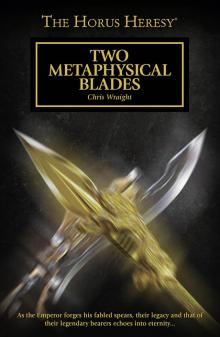 Two Metaphysical Blades
Two Metaphysical Blades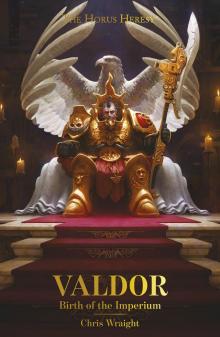 Valdor: Birth of the Imperium
Valdor: Birth of the Imperium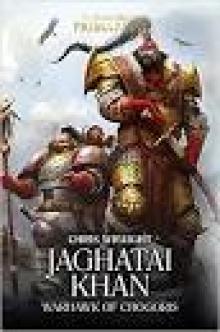 JAGHATAI KHAN WARHAWK OF CHOGORIS
JAGHATAI KHAN WARHAWK OF CHOGORIS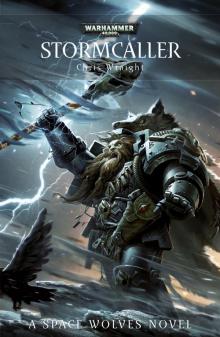 Stormcaller
Stormcaller Child of Chaos
Child of Chaos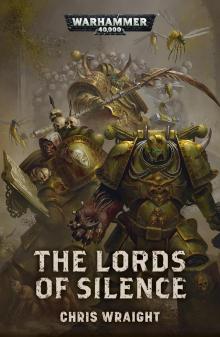 The Lords of Silence
The Lords of Silence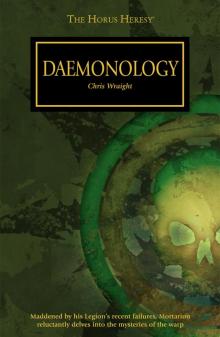 Daemonology
Daemonology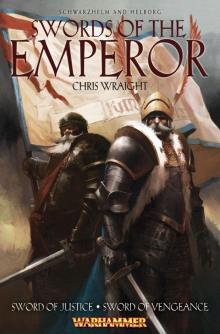 Swords of the Emperor
Swords of the Emperor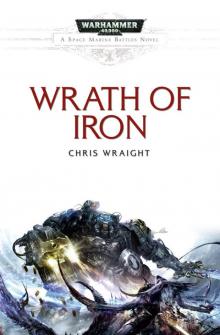 Wrath of Iron
Wrath of Iron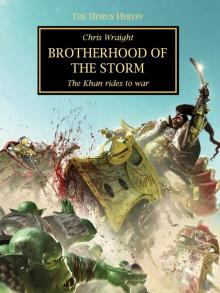 Brothers of the Storm
Brothers of the Storm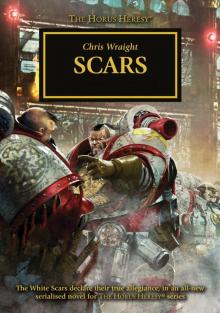 Horus Heresy: Scars
Horus Heresy: Scars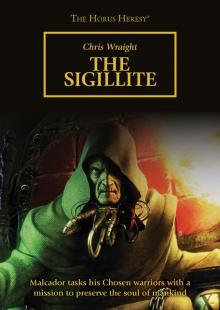 The Sigillite
The Sigillite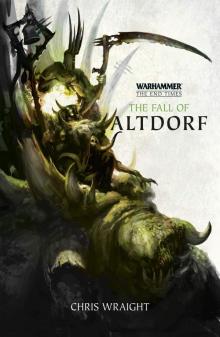 The End Times | The Fall of Altdorf
The End Times | The Fall of Altdorf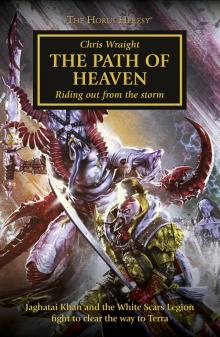 The Path of Heaven
The Path of Heaven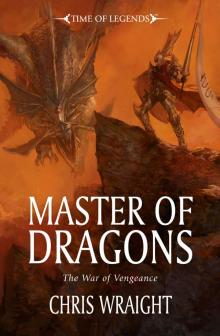 Master of Dragons
Master of Dragons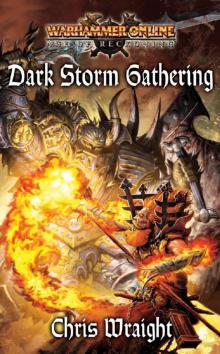 WH-Warhammer Online-Age of Reckoning 02(R)-Dark Storm Gathering
WH-Warhammer Online-Age of Reckoning 02(R)-Dark Storm Gathering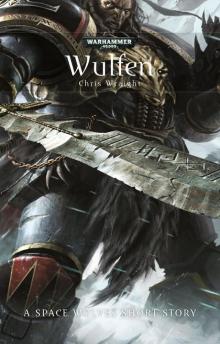 Wulfen
Wulfen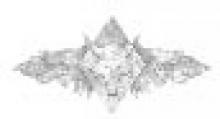 Battle Of The Fang
Battle Of The Fang Onyx
Onyx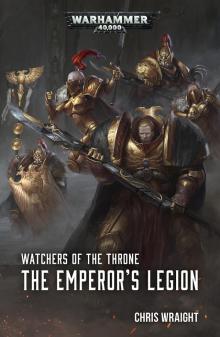 Watchers of the Throne: The Emperor’s Legion
Watchers of the Throne: The Emperor’s Legion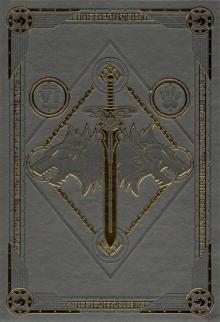 Leman Russ: The Great Wolf
Leman Russ: The Great Wolf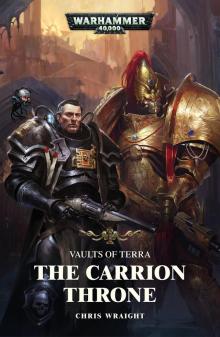 Vaults of Terra: The Carrion Throne
Vaults of Terra: The Carrion Throne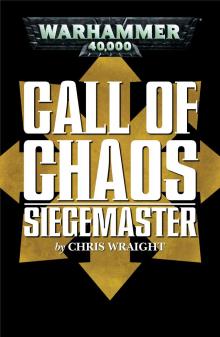 Siegemaster
Siegemaster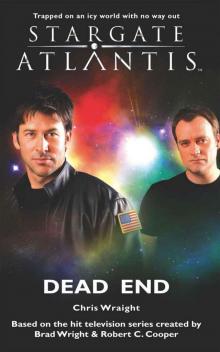 STARGATE ATLANTIS: Dead End
STARGATE ATLANTIS: Dead End Scars
Scars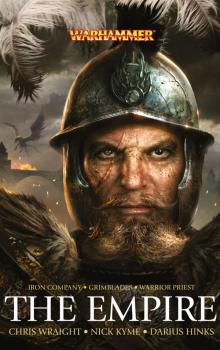 The Empire Omnibus
The Empire Omnibus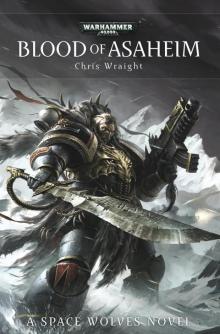 Blood of Asaheim
Blood of Asaheim